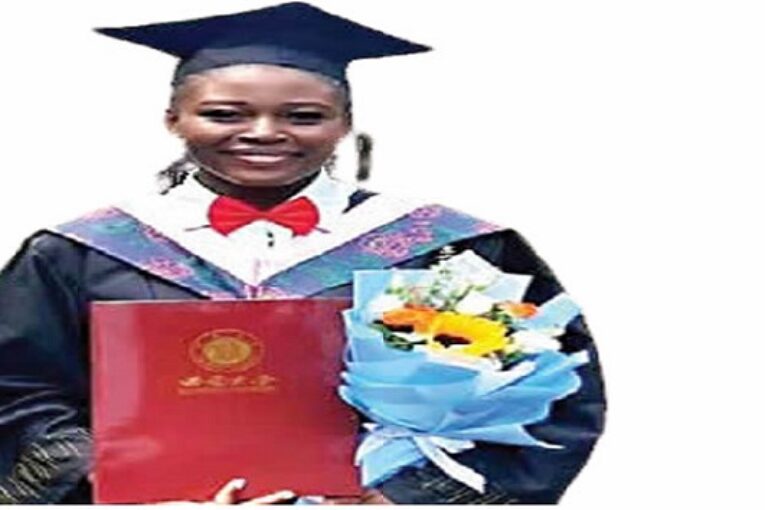
Ifeoma Amuche, a Nigerian and student of Southwest University, China, who emerged as one of the best-graduating students of the school, shares her experience with FATTEH HAMID about learning Mandarin language and settling down in China
Where are you from?
I’m Ifeoma Amuche. I’m from Oko Local Government Area of Anambra State and I recently graduated as one of the best-graduating students at Southwest University, China, where I studied Chinese Language and Literature.
How do you feel about your emergence as one of the best-graduating students at Southwest University, China?
I was happy to know I was graduating as one of the best-graduating students. I was glad that I learnt well and that my four years of hard work at the university paid off.
You became the talk of the country when the video of you delivering a valedictory speech surfaced online. Was that not overwhelming for you? How did you feel?
Coming online to see that my phone was buzzing and everyone was speaking about me, I was thrilled. It was surreal and overwhelming because I never believed the speech I delivered here in China would travel back home before me. I thank God for that.
How did your educational journey start?
I started my education in Nigeria; it is not that I was born here (in China). My primary education started in northern Nigeria, precisely in Katsina State between 2004 and 2009 before I went back to the East in 2009. My secondary school education was at Federal Polytechnic, Oko Staff School. I furthered into Federal Polytechnic, Oko, Anambra State, where I did my National Diploma in Library and Information Science. It was over there in Anambra State, while I was doing my National Diploma programme that I came across a Confucius classroom in my school. I combined learning Mandarin at that time with my ND. I found the Mandarin language exciting and I love the language as a hobby and I decided to pick it up as an extracurricular activity.
So, you speak Hausa language too?
Well, I used to be very fluent when I was in Katsina State but I left in 2009 and I can’t ascertain if I’m still as fluent as I was at that time because there is no one to speak the language with for about 14 years now. Back then in Katsina State, we were taught in school with Hausa language and my classmates were Hausa. So, it was easy to learn and speak the language comfortably at the time. When people talked then, I knew and understood what they were saying clearly but I’m not that certain if I can speak it fluently now.
How many languages do you speak?
I speak Chinese, Igbo, English, and Hausa languages.
Have you always been the best student in your primary and secondary school?
Well, I was always the best back then in Katsina State and I’ve changed schools many times because of my location. During my Junior Secondary School education, I wasn’t a topper because it took me a lot of time to settle but when I got to the senior school, I was one of the best in my classes.
How easy was it to learn the language as an extracurricular activity?
Well, as I said, I found Chinese and I love the language which I decided to study. The Confucius class was meant to be a two-year course but I joined late and despite that, I graduated with a top grade. After I was done, I got a job at Dangote Refinery as a translator.
How did you become a student of Southwest University, China?
While I was working in Dangote as a translator, an opportunity came to apply to a university in China. I applied with my proficiency certificate which I passed and that was how I got admission and came to China.
Were your studies under a Federal Government scholarship?
No, I’m not under the Federal Government of Nigeria’s scholarship. However, when I got here, I got a Silk Road Scholarship here in China which was given to me by my school. So, I studied here through the Silk Road Scholarship.
What was it like settling down in China? How did you embrace the new culture, new environment?
It was not easy for me, especially living all alone for the first time. I had to start adjusting to a life I never experienced. So, it wasn’t very easy but I soon learnt to adjust. Also, for the meal times, there were times I missed lunch especially because here in China, their cultures are different. They have stipulated time for eating, unlike Nigeria where you eat at your disposal. Breakfast is taken around 5am or 6am, lunch is taken around 11 am or 12 noon. The beautiful thing about it is the fact that at this period, there is a cluster and a good number of people at all of these restaurants, but this is not the case back home. So, it was not easy to adjust.
What about adapting to the people?
Well, that was also another thing but it wasn’t too difficult for me. We had other international students and some understood English which made it easy. We had people from Thailand, Ethiopia, Madagascar, etcetera. I had to learn what to say and what not to say to them, but by the time I was in my Part Two, I already learnt all of these and it became easier.
You said your learning of Chinese started here in Nigeria. Did you learn to completely read and write while you were here?
I won’t say that I knew how to speak well enough when I was over there in Nigeria. No. I was still a beginner and had much to learn. About writing the Chinese alphabet, I must be honest that it is still difficult to learn the alphabet. We have over 10,000 Chinese alphabets and maybe I know up to 6,000. The difficult thing about these alphabets is the fact that they are like drawing and immediately you miss a stroke, whatever you are writing has a different meaning entirely. So, you have to be careful when writing. All of these alphabets have their origins and the reason why they were created. It takes a lot to know them. Even the locals do not know all of these alphabets. It is a different ball game when I’m writing with my system, though I know what I’m writing.
What was your most challenging time as an undergraduate? How were you able to scale through?
This was during the COVID-19 pandemic. Everything was online and courses that were supposed to be in person were cancelled; so, we were unable to offer these courses. It was tough but I scaled through. Also, there was a time in 2022 that I went to represent my school at the Chinese Poetry Conference in Beijing, China. My school sent me to represent international students over there. So, I was in Beijing and my scores dropped down from 90 marks to 80 marks minimum for courses I was taking online which affected my CGPA but the good thing was that I never got less than 80 despite the obvious deductions. Life isn’t meant to be simple and we will always have to encounter some difficulties. I’m grateful for that conference because I spent a month learning a lot while I was there and it was an addition to my knowledge.
-Punch





